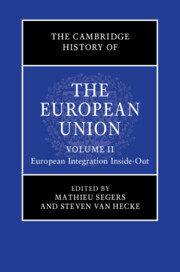Book contents
- The Cambridge History of the European Union
- The Cambridge History of the European Union
- The Cambridge History of the European Union
- Copyright page
- Contents
- Figures
- Tables
- Contributors to Volume II
- Acknowledgements
- Abbreviations
- Reflections on the History and Historiography of European Integration
- Part I Milestones: Treaties and Treaty Changes
- Part II Instruments of Integration
- Part III Narratives and Outcomes
- War and Peace
- 16 A Global Perspective on European Cooperation and Integration since 1918
- 17 War, Peace and Memory: Franco-German Reconciliation
- 18 The ‘Saints’ of European Integration: From Visionaries to Architects
- Prosperity and Solidarity
- Democracy and Legitimacy
- Index
- References
18 - The ‘Saints’ of European Integration: From Visionaries to Architects
from War and Peace
Published online by Cambridge University Press: 12 October 2023
- The Cambridge History of the European Union
- The Cambridge History of the European Union
- The Cambridge History of the European Union
- Copyright page
- Contents
- Figures
- Tables
- Contributors to Volume II
- Acknowledgements
- Abbreviations
- Reflections on the History and Historiography of European Integration
- Part I Milestones: Treaties and Treaty Changes
- Part II Instruments of Integration
- Part III Narratives and Outcomes
- War and Peace
- 16 A Global Perspective on European Cooperation and Integration since 1918
- 17 War, Peace and Memory: Franco-German Reconciliation
- 18 The ‘Saints’ of European Integration: From Visionaries to Architects
- Prosperity and Solidarity
- Democracy and Legitimacy
- Index
- References
Summary
Integration research has dealt with ‘founding fathers’ of the European Union (EU)1 as an ambiguous subject in order not to speak of ‘saints’ right away. Is that an appropriate term? If yes and this notion is taken seriously, who should be considered for it? In fact, there are different categories. This issue is about recognising, naming and valuing reference persons and personalities in the history of Europe’s unification, but is it really about ‘saints’? Further questions arise. How far back should we focus? Should we go back to the nineteenth century, or should we start after the First World War, or even after the Second World War? Is it about those who gave us the idea of Europe’s unification or about the founders of the communities?
- Type
- Chapter
- Information
- The Cambridge History of the European Union , pp. 508 - 539Publisher: Cambridge University PressPrint publication year: 2023

